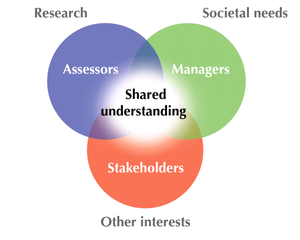Implementation plan of evidence-based policy
| [show] |
|---|
Scope
How can the better policy practises identified in-project be implemented into national governance(?)? Especially actions that support the government(?) are examined.
Answer
The implementation plan includes three new social innovations, that will be taken into use in the decision preparations (?) supporting the government's work. These are a) shared understanding as a goal for information work(?), b) variables in structuring and interpreting of information and c) respect theory to motivate the production of information.

<section begin=glossary />
- Shared understanding between two individuals about a particular topic means a situation where each individual is able to correctly explain what the other thinks about the topic and why. This definition can be extended also to a larger group. Here shared understanding is a written description of the topic that covers the thinking and reasoning on the topic of all members. In this group setting, not everyone needs to be able to describe everyone else's thinking, but everyone should agree that the written description correctly contains their thinking about the topic. In this way, although not everything is known by everyone in the group, the written description effectively represents the shared understanding of the group. Importantly, online tools such as wikis can be used to develop shared understanding even about complex topics among large groups.
- It is important to notice that shared understanding is not the same as consensus or agreement. In shared understanding people can still disagree on the topic, but they agree on what opinions there are about it. While the purpose of agreement in decision-making is to conclude about the best option and act based on it, the purpose of shared understanding is to identify one or more poor decision option that should be rejected. This is analogous to the scientific method. Instead of attempting to find the truth directly, it critically evaluates hypotheses and rejects all that are not plausible in the light of observations. As the scientific method has proved to be the best method known for developing knowledge about the world, shared understanding may prove to be an effective way to make public policy.
<section end=glossary />